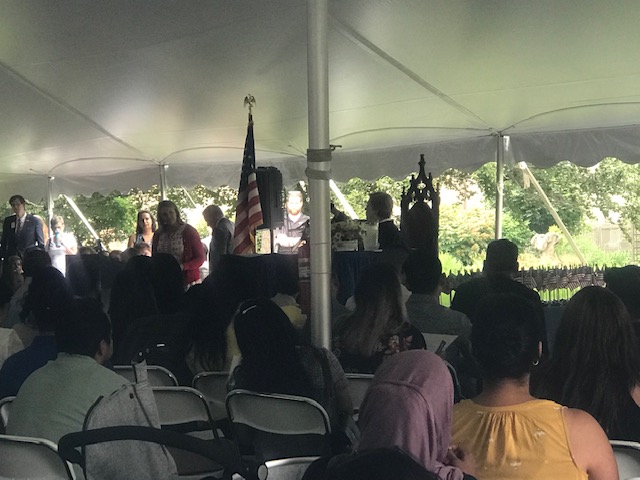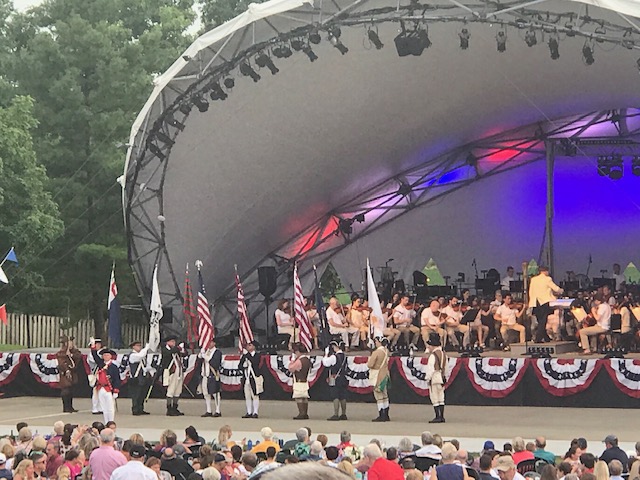Why was I nearly crying? After a lot of soul-searching, I think I know. But let me set the stage for you. In the end, you may want to give it a try for yourself.
Our family decided that this year’s Independence Day celebration would be a day early, on July 3rd. As we often do, we planned to attend an outdoor concert, held at Conner Prairie, a living history site north of Indianapolis. The 1812 Overture, some Sousa numbers, and a few other patriotic-themed pieces would be played by the Indianapolis Symphony Orchestra against a backdrop of fireworks. Always special.
I normally don’t cry, though. It’s moving, to be sure, but not where I’m verging on weeping. This time was different. The tears wanted to flow. They welled in my eyes. I kept them back with great difficulty. My upper lip was sore from the stiffness.
I’m still sorting it out in my head. I think I know why.
I had taken our two daughters to a US naturalization ceremony earlier in the day. It was on the lawn of the President Benjamin Harrison Home. We stood on the edge of a tent-covered court session. Beneath the canvas people from across the globe raised their hands and said the oath of allegiance in front of US District Judge Sarah Evans Barker. Judge Barker, friendly and stern all at once, noted that the sides of the tent were up and open, wall-less. Children from the crowd carried a small American flag to each of these new Americans. The rest of us at the gathering–and there were many witnesses and onlookers packed under the sprawling white tent–clapped and cheered. Judge Barker announced the court adjourned. My very first attendance at such an event was over.
Seven hours later, I’m on a sloping meadow with a few thousand other people. At the bottom of the slope is Conner Prairie’s gleaming concert shell and two large video screens. My wife and I sip wine, our daughters and their friends are close by. On a warm summer evening, the orchestra plays selections from The Patriot, a movie about the American Revolution. Sweet notes rise from the strings section, ahead of distant fifing from the winds and rat-a-tat-tatting by the percussions. Later will be readings from the Gettysburg Address, the finale of Tchaikovsky’s famous overture, and explosions from fireworks and artillery.
I couldn’t stop thinking about the earlier ceremony. The two parts of the day had an invisible connection. In the morning one group made a life-changing choice. In the evening another group honored a world-changing decision. Both were strangers to each other and as individuals may never meet, yet they belong to the same family of Americans. Both share the same place, bound by the same ideas and ideals, ageless so long as they are remembered. Both seek the best as they best define it. Both are living out a birth called a Declaration. Together, both led me to tears.
Wiping my eyes, I think about the numbers. 98 and 56. 98 women and men in Indianapolis on Wednesday, July 3, 2019 swore allegiance to the United States and joined the rest of us as American citizens. 56 men in Philadelphia on Wednesday, July 3, 1776, prepared to be signatories to the final draft of the Declaration of Independence.
Take a few seconds and think about that. What if we could introduce the 98 to the 56? How utterly astonished, how amazed and overwhelmed, would the signers be at the sight of the oath-takers? What impressions of the 56 would first form in the minds of the 98 and which of those views would endure? What would they talk about together after they had settled in?
Just a suggestion: if you can, try to pair your attendance at a US naturalization ceremony with your attendance at a July 4th celebration. I’m guessing you’ll feel it.
Life is a River, and a few drops in the current are tears.
All the best, Dan









